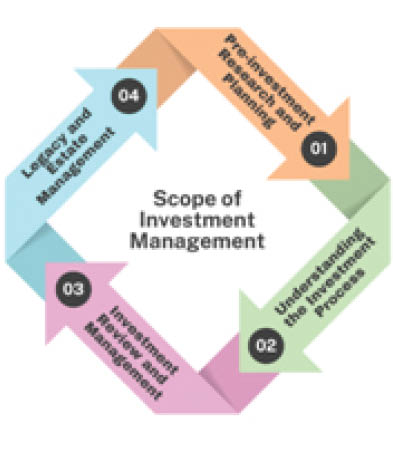Managing Your Investments (I)
Today, we will take up ‘managing your investments’, the scope of which can be broken into four, as follows: Pre-investment Research and Planning Understanding the Investment Process Investments Review and Management Legacy and Estate Management Pre-investment Research and Planning: This is the first stage and during which you will assess where you are and what […]

managing your investments
Today, we will take up ‘managing your investments’, the scope of which can be broken into four, as follows:
- Pre-investment Research and Planning
- Understanding the Investment Process
- Investments Review and Management
- Legacy and Estate Management
Pre-investment Research and Planning: This is the first stage and during which you will assess where you are and what you want to achieve in the short, medium and long run. The activities here would include:
- Defining your current realities in terms of your business/working career (which will bring out how many years you have to your statutory or planned retirement), financial situation, etc.
- Coming up with your retirement goals.
- Developing your investment principles and goals.
Based on the above, you will need to work out your investment budget that will show how much you will need to invest over the years to achieve your set immediate and retirement goals.
This preparatory stage is fundamental and crucial to the success of the rest of the investment management process. It is a research stage on what you have, what you want, what you can do, what you need to do, understanding the investment opportunities and landscape, identifying risk tolerance over the various planning timelines etc. It is about developing your strategy on the investment options available towards building an asset base, income, cash flow, and capital appreciation requirements. Remember what Abraham Lincoln was quoted as saying? “ Give me six hours to chop down a tree and I will spend the first four sharpening the axe”. The seeds for most of the successes you will achieve in the next stages need to be sown here.
Understanding the Investment Process: Once you are reasonably clear on the ‘broad mix’ of assets that you will be investing in over various planning stages, you will need to understand the investment processes, which may be peculiar to different assets. I mean, the process of setting up a poultry farm business involving a feasibility study, business planning, registration with the Corporate Affairs Commission, buying farmland in your villlage, acquiring other required fixed assets, employing staff, etc. will be markedly different from investing the same capital amount in Treasury Bills or shares of UBA plc. The point is that you need to understand the different pathways you will require to take to invest in different assets. A lack of understanding of these processes is a major source of career persons losing tons of money to less than honourable individuals in our environment. It is crucial that you involve professionals that you not only trust as being honourable but who are also competent in their fields with proven records of successes. Even at that, you should check and cross-check, as well as go cautiously.
An integral part of understanding the investment process is in communication and documentation. Communication with persons and organisations you are dealing with should be clear, unambiguous and timely. When issues are agreed on phone or during meetings, it is important to immediately communicate them formally. Always, always and always, you should document agreements and have same shared with other parties on a need-to-know basis.
A few takeaways as on the two stages above are as follows:
- Be knowledgeable and engage with the right ‘tribe’: As I would always say, build your tribe of investment professionals such as bankers, stockbrokers, estate agents, insurance salespersons, etc. Listen to them but make your own decisions. A way to build confidence in investment is to read widely, engage with other investors and generally make sure you know what is happening in the local and global economies and specifically in the industries you are interested in.
- Start as early as you can. I mean, some of us are probably starting ‘late’ already. It doesn’t matter. Remain calm and do what is right without subjecting yourself to psychological pressures that could lead you into making unwise investment decisions. We should also teach those behind us, who might just be starting their businesses and working careers, to start retirement planning early and how they could do and get it right, thereby avoiding the timing errors we may have made. This is a great value-add to those individuals and our society.
- Start safe and cautiously. As with most things in life, it is important that you test the waters gradually until you build your knowledge, relationships and skills over reasonable time. This doesn’t mean that we should procrastinate or that we shouldn’t be ambitious when the right opportunities show up. Remember that some opportunities might not show up again in a lifetime.
I remember an uncle of mine contacting me about a prime property in Lagos that the organisation he worked for was going to sell and he was in charge. I honestly could have packaged a deal with other young investors of the time and acquired the property at a good value. I didn’t. And I didn’t not because I couldn’t work out a deal but because I failed to think through and see ahead.
On the other hand, however, we will not get everything right all the time. We should be happy striving to do our best all the time but understand that we are fallible.
Next week, we will take up Investment Review and Management as well as Legacy and Estate Management.
